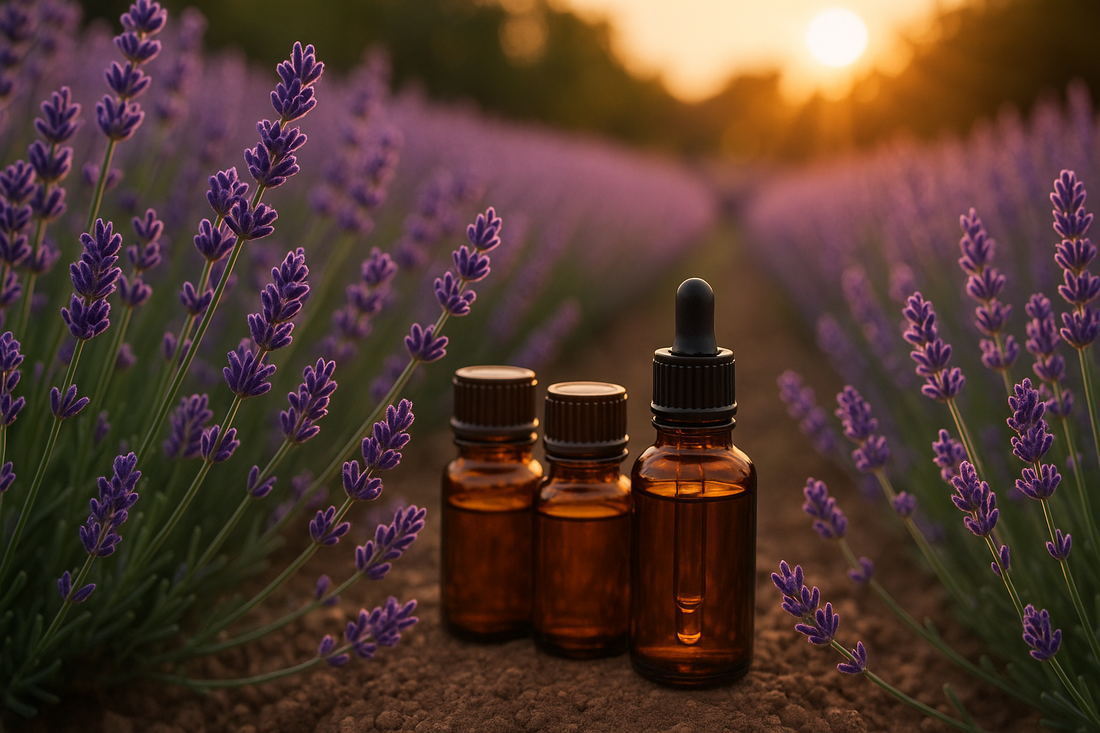
Organic, Pure, or Synthetic: Which Essential Oils Are Right for You?
Essential oils come with all sorts of labels: organic, pure, synthetic—and it’s easy to feel lost in the jargon. Are you splashing out on organic for a reason, or is pure just as good? And what’s the deal with synthetic anyway? Let’s unpack the differences so you can figure out which type fits your needs. Along the way, we’ll see why Aromatherapy Trade Council (ATC) members focus on quality—and how that helps you choose with confidence.
Organic: The Natural Choice
Organic essential oils come from plants grown without synthetic pesticides, fertilisers, or GMOs. Think lavender fields tended under strict rules, certified by bodies like the Soil Association in the UK or EcoCert globally. The oil’s extracted—usually by steam distillation or cold pressing—with no chemical shortcuts, keeping it as close to nature as possible.
Why go organic? It’s about peace of mind. If you’re using oils on your skin or diffusing around kids or pets, organic means fewer worries about pesticide traces. The scent might feel earthier too, reflecting the plant’s natural quirks—though it’s not always stronger or “better” than non-organic. The catch? Organic costs more—£10–£30 for a 10ml bottle of lavender vs. £5–£15 for standard—because farming and certification aren’t cheap. ATC members offering organic oils back it up with legit credentials, not just a trendy label.
Pure: Straight from the Plant
Pure essential oils are what they sound like—100% extracted from a single plant species, with nothing added or taken away. No carrier oils, no synthetics—just the real deal, like peppermint (Mentha piperita) or tea tree (Melaleuca alternifolia). “Pure” doesn’t mean organic, though—it’s about authenticity, not growing methods. A pure oil could come from conventionally farmed plants, but it’s still unadulterated.
The upside? Purity gives you the plant’s full aroma and benefits—think eucalyptus clearing your sinuses or lemon lifting your mood. It’s versatile and reliable, especially at £5–£20 for everyday oils. ATC members prioritise this purity, testing batches to ensure you’re not getting a watered-down fake. The downside? It’s not a guarantee of top-tier quality—purity’s just the baseline, and growing conditions or extraction can still vary.
Synthetic: The Lab-Made Option
Synthetic oils (or fragrance oils) aren’t from plants—they’re cooked up in labs to mimic natural scents. Chemists blend compounds to smell like lavender, rose, or even rare oils like sandalwood, often at a fraction of the cost—£2–£5 for 10ml. They’re common in candles, air fresheners, or cheap “aromatherapy” kits, but they’re not true essential oils.
Why choose synthetic? Price and consistency. They’re dirt cheap and smell the same every time—no batch variation like with plants. But here’s the rub: they lack the natural compounds that give essential oils their therapeutic punch. No calming linalool from real lavender, no zingy limonene from actual citrus—just a scent. They might irritate skin too, since they’re not designed for aromatherapy. ATC members steer clear of synthetics—they’re all about the real stuff that works.
How Do They Compare?
Picture this: organic lavender oil (£15) from an ATC supplier is grown pesticide-free in Provence, distilled purely, and smells subtly floral—great for a bath. A pure lavender (£8) is also plant-derived, maybe from a conventional farm, still potent for diffusing. A synthetic lavender (£3) smells close enough for a candle but won’t soothe your nerves. The organic and pure options deliver aromatherapy benefits; the synthetic’s just a pretty whiff.
Price reflects effort. Organic’s priciest due to strict farming and certification—think £30+ for rose or jasmine. Pure oils hit a sweet spot (£5–£50 depending on rarity), while synthetics undercut everything but offer little beyond fragrance. ATC members focus on organic and pure, ensuring labels match contents—check for “100% pure essential oil” or an organic logo like Soil Association.
Why Quality Matters (and Why ATC Members Get It)
Quality’s not just a buzzword—it’s what makes an oil safe and effective. A dodgy synthetic or adulterated “pure” oil might trigger allergies or do nothing at all. Organic and pure oils from ATC suppliers, though, come with a promise. The ATC’s strict standards mean members test for purity (no sneaky fillers), label accurately (batch numbers, origins, safety info), and source ethically. You might pay £12 for their tea tree instead of £4 elsewhere, but it’s potent, traceable, and won’t let you down.
Take chemotypes—oils like thyme (Thymus vulgaris) can vary wildly (linalool for calm, thymol for punch). ATC members specify this on labels so you’re not guessing. Organic oils from them carry legit certifications, not vague claims. Synthetics? They don’t even make the cut—ATC’s about oils that work, not just smell nice.
Which One’s Right for You?
It boils down to your priorities:
- Organic: Perfect if you want natural, eco-friendly oils and don’t mind the cost—ideal for skin use or sensitive households. Expect £10–£50 from ATC suppliers.
- Pure: The go-to for most—affordable, effective, and versatile for diffusing or blending. £5–£30 gets you quality from ATC members.
- Synthetic: Fine for scenting a room cheaply but skip it for aromatherapy—£2–£5 won’t cut it for wellbeing.
Newbie? Start with a pure single oil like lavender or peppermint from an ATC supplier—affordable and foolproof. Love green living? Splash out on organic. Just want a cheap room spray? Synthetic’s your pick, but don’t expect miracles.
Tips to Choose Smart
- Read the Label: “100% pure” for authenticity, an organic logo for certification—ATC members nail this.
- Set a Budget: £5–£15 for basics, £20+ for specialities.
- Check the Source: ATC suppliers mean quality you can trust—skip the mystery bargain bin.
- Test It Out: Grab a small bottle (5ml) to see what clicks.
The Bottom Line
Organic, pure, or synthetic—it’s your call based on what you value. Organic offers natural purity at a premium, pure delivers plant power for less, and synthetic’s a budget scent with no depth. ATC members prioritise the first two, giving you oils that are safe, real, and worth every penny. So, next time you shop, think about what you’re after—then pick a bottle from an ATC supplier. You’ll smell the difference and feel it too!


